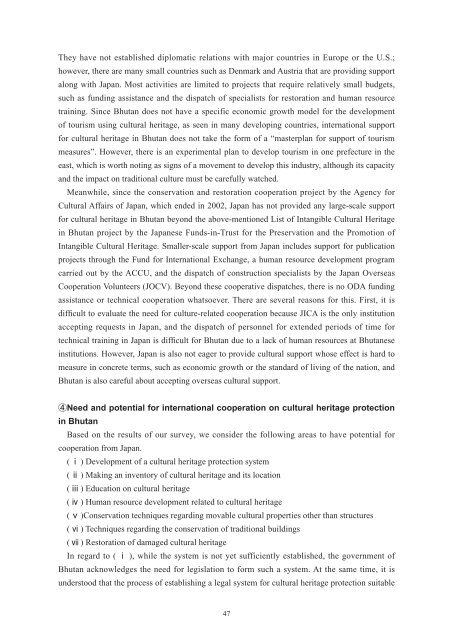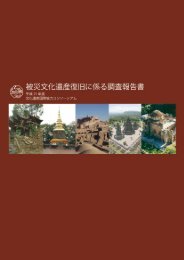English - JCIC-Heritage
English - JCIC-Heritage
English - JCIC-Heritage
You also want an ePaper? Increase the reach of your titles
YUMPU automatically turns print PDFs into web optimized ePapers that Google loves.
They have not established diplomatic relations with major countries in Europe or the U.S.;<br />
however, there are many small countries such as Denmark and Austria that are providing support<br />
along with Japan. Most activities are limited to projects that require relatively small budgets,<br />
such as funding assistance and the dispatch of specialists for restoration and human resource<br />
training. Since Bhutan does not have a specific economic growth model for the development<br />
of tourism using cultural heritage, as seen in many developing countries, international support<br />
for cultural heritage in Bhutan does not take the form of a “masterplan for support of tourism<br />
measures”. However, there is an experimental plan to develop tourism in one prefecture in the<br />
east, which is worth noting as signs of a movement to develop this industry, although its capacity<br />
and the impact on traditional culture must be carefully watched.<br />
Meanwhile, since the conservation and restoration cooperation project by the Agency for<br />
Cultural Affairs of Japan, which ended in 2002, Japan has not provided any large-scale support<br />
for cultural heritage in Bhutan beyond the above-mentioned List of Intangible Cultural <strong>Heritage</strong><br />
in Bhutan project by the Japanese Funds-in-Trust for the Preservation and the Promotion of<br />
Intangible Cultural <strong>Heritage</strong>. Smaller-scale support from Japan includes support for publication<br />
projects through the Fund for International Exchange, a human resource development program<br />
carried out by the ACCU, and the dispatch of construction specialists by the Japan Overseas<br />
Cooperation Volunteers (JOCV). Beyond these cooperative dispatches, there is no ODA funding<br />
assistance or technical cooperation whatsoever. There are several reasons for this. First, it is<br />
difficult to evaluate the need for culture-related cooperation because JICA is the only institution<br />
accepting requests in Japan, and the dispatch of personnel for extended periods of time for<br />
technical training in Japan is difficult for Bhutan due to a lack of human resources at Bhutanese<br />
institutions. However, Japan is also not eager to provide cultural support whose effect is hard to<br />
measure in concrete terms, such as economic growth or the standard of living of the nation, and<br />
Bhutan is also careful about accepting overseas cultural support.<br />
4Need and potential for international cooperation on cultural heritage protection<br />
in Bhutan<br />
Based on the results of our survey, we consider the following areas to have potential for<br />
cooperation from Japan.<br />
(ⅰ) Development of a cultural heritage protection system<br />
(ⅱ) Making an inventory of cultural heritage and its location<br />
(ⅲ) Education on cultural heritage<br />
(ⅳ) Human resource development related to cultural heritage<br />
(ⅴ)Conservation techniques regarding movable cultural properties other than structures<br />
(ⅵ) Techniques regarding the conservation of traditional buildings<br />
(ⅶ) Restoration of damaged cultural heritage<br />
In regard to ( ⅰ ), while the system is not yet sufficiently established, the government of<br />
Bhutan acknowledges the need for legislation to form such a system. At the same time, it is<br />
understood that the process of establishing a legal system for cultural heritage protection suitable<br />
47




